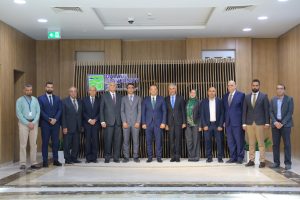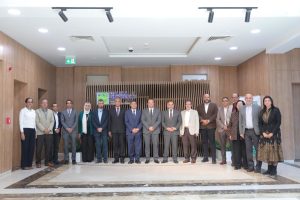The Faculty of Engineering at Galala University proudly hosted Dr. Yutaka Sasaki from Hiroshima University, Japan, in a significant academic event that reflects the university’s dedication to fostering international collaboration and advancing sustainable innovation in the field of energy systems.
Dr. Sasaki delivered an enlightening lecture titled “Challenges and Trends in Japan’s Electric Power System and Research Topics in Hiroshima University,” offering participants a deep understanding of Japan’s efforts to achieve carbon neutrality and address the evolving challenges of integrating renewable energy sources—such as solar and wind power—into national energy grids.
From the perspective of sustainable development, Dr. Sasaki emphasized the growing need for advanced Energy Management Systems (EMS) capable of handling the variability and uncertainty associated with renewable energy generation. He introduced groundbreaking research conducted at Hiroshima University, including the development of neural network-based models for solar radiation and electricity demand forecasting. These innovative models enable day-ahead and intra-day planning, ensuring more efficient and reliable power system operation.
The lecture also covered cutting-edge methodologies such as robust supply-demand planning, load frequency control using model predictive control, and operation control methods employing grid-forming inverters—all of which are critical to maintaining grid stability in an era of increasing renewable integration.
The event provided valuable insights for students and faculty, enhancing their understanding of global energy trends, advanced forecasting techniques, and innovative system management approaches. It also served as a platform to strengthen academic ties between Galala University and Hiroshima University, paving the way for future cooperation in research, technology development, and sustainable education.
This collaboration aligns with Galala University’s strategic vision to contribute to global knowledge exchange and sustainable progress, supporting several United Nations Sustainable Development Goals (SDGs)—including SDG 7: Affordable and Clean Energy, SDG 9: Industry, Innovation, and Infrastructure, and SDG 17: Partnerships for the Goals—as the university continues to empower research and innovation that drive a cleaner, smarter, and more sustainable future.


